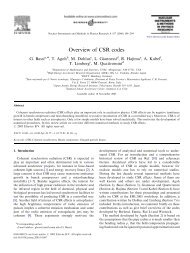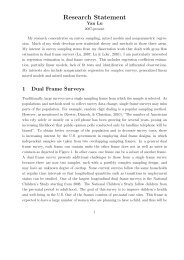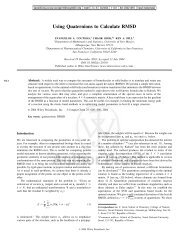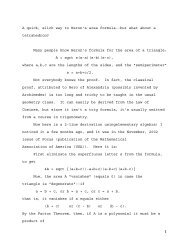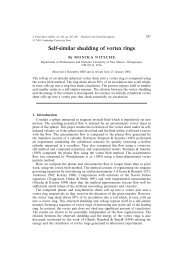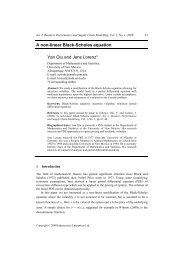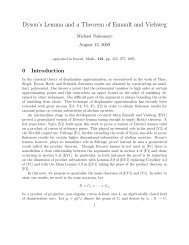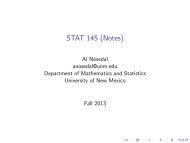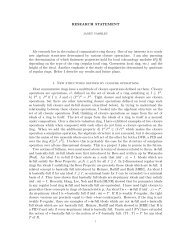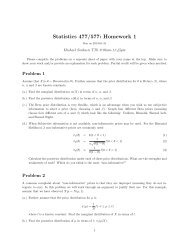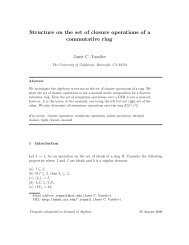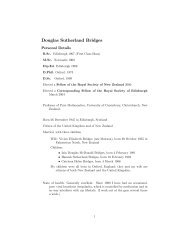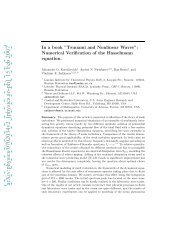OEO Office of Equal Opportunity - Department of Mathematics and ...
OEO Office of Equal Opportunity - Department of Mathematics and ...
OEO Office of Equal Opportunity - Department of Mathematics and ...
Create successful ePaper yourself
Turn your PDF publications into a flip-book with our unique Google optimized e-Paper software.
ECONOMICS 179<br />
human resources, health, natural resource use <strong>and</strong> the environment<br />
<strong>and</strong> trade <strong>and</strong> development.<br />
The major is an excellent choice for those interested in public<br />
policy <strong>and</strong> market research <strong>and</strong> students wanting careers<br />
in business, government <strong>and</strong> other organizations. An economics<br />
major is also highly desirable for students wanting<br />
to go on to study law, business, public administration <strong>and</strong><br />
international affairs.<br />
Major Study Requirements<br />
A major in economics requires a common core consisting <strong>of</strong><br />
ECON 105 (Introductory Macroeconomics), 106 (Introductory<br />
Microeconomics), 300 (Intermediate Microeconomics I), 303<br />
(Intermediate Macroeconomics I) <strong>and</strong> 309 (Introductory<br />
Statistics <strong>and</strong> Econometrics) plus 18 credit hours <strong>of</strong> electives<br />
in economics with a maximum <strong>of</strong> 3 credit hours from 200-level<br />
courses, for a total <strong>of</strong> 33 hours.<br />
All economics majors are encouraged to complete one<br />
semester <strong>of</strong> calculus (MATH 162 or 180). Majors planning<br />
to attend graduate school should consult with the economics<br />
undergraduate advisor concerning additional requirements.<br />
Students are encouraged to discuss the selection <strong>of</strong> electives<br />
with the economics undergraduate advisor. Most students<br />
select courses based on their career plans or interests.<br />
Please note that the following listings are not intended to limit<br />
the student’s choice.<br />
Business economics for students planning to pursue a career<br />
in the business sector: suggested electives include ECON<br />
315, 320, 332, 333, 350, 408, 424 <strong>and</strong> 429.<br />
Government economics for students planning to pursue a<br />
career with a local, state or federal government agency: suggested<br />
electives include ECON 315, 320, 332, 333, 335, 341,<br />
342, 343, 350, 408, 409, 424, 429 <strong>and</strong> 445.<br />
Pregraduate study preparation for students interested in<br />
pursuing a graduate degree in economics, business, public<br />
administration or other fields: suggested electives include<br />
ECON 315, 320, 342, 350, 400, 403, 407, 409, 424, 429<br />
<strong>and</strong> 442. A two-semester calculus sequence <strong>and</strong> a semester<br />
<strong>of</strong> introductory statistics are essential for students planning<br />
graduate work in economics.<br />
Pre-law preparation for students interested in attending law<br />
school: suggested electives include ECON 320, 330, 332,<br />
333, 335, 342, 350 <strong>and</strong> 445.<br />
Electives for students who wish to focus their study on specific<br />
fields <strong>and</strong> current economic issues: suggested electives<br />
include courses in International <strong>and</strong> Latin American economies<br />
(ECON 321, 421, 423, 424 <strong>and</strong> 429), natural resources<br />
<strong>and</strong> environmental economics (ECON 342, 343 <strong>and</strong> 442),<br />
labor <strong>and</strong> human resources (ECON 320, 335, 410 <strong>and</strong> 427),<br />
public finance (ECON 350, 445 <strong>and</strong> 450) <strong>and</strong> economic<br />
modeling, forecasting <strong>and</strong> policy analysis (ECON 407, 408,<br />
409 <strong>and</strong> 445).<br />
Minor for Economics Majors<br />
An interdisciplinary approach is useful in the study <strong>of</strong><br />
economics. Economics majors are encouraged to seek a<br />
minor in disciplines such as Political Science, Sociology,<br />
History, Business, Math or Computer Science. Students<br />
should discuss the selection <strong>of</strong> a minor with the economics<br />
undergraduate advisor. Students with specialized interests<br />
may design a distributed minor <strong>and</strong> petition the <strong>Department</strong><br />
Chairperson for approval.<br />
Minor Study Requirements<br />
Economics makes an excellent minor for students pursuing<br />
majors such as Management, Political Science, Journalism<br />
<strong>and</strong> Biology <strong>and</strong> for those building a pre-pr<strong>of</strong>essional bachelor’s<br />
degree such as pre-law, pre-M.B.A. or pre-M.P.A.<br />
For example, a student with a political science major may<br />
consider, in addition to the core economics courses, electives<br />
in international economics, public finance or human resource<br />
economics. A student with a business major may consider<br />
economics electives in public finance <strong>and</strong> international<br />
economics. Students planning for a law degree might consider<br />
an economics minor with emphasis on environmental<br />
<strong>and</strong> natural resource economics.<br />
A minor in economics requires a total <strong>of</strong> 18 credit hours consisting<br />
<strong>of</strong> 9 hours in required courses (ECON 105, 106 <strong>and</strong><br />
either 300 or 303) plus 9 hours from elective courses with a<br />
maximum <strong>of</strong> 3 hours at the 200-level.<br />
<strong>Department</strong>al Honors<br />
The departmental honors program is open to outst<strong>and</strong>ing<br />
economics majors, typically in their junior year. After consulting<br />
with a faculty member willing to supervise their research,<br />
students must enroll in the department’s honors courses,<br />
Reading for Honors (ECON 497 <strong>and</strong>/or 498) <strong>and</strong> Senior<br />
Honors Thesis (ECON 499). These courses are in addition<br />
to those required for the major. University requirements for<br />
graduating with departmental honors include an overall grade<br />
point average <strong>of</strong> 3.20 <strong>and</strong> at least 7 credit hours in departmental<br />
honors courses. Interested students should contact<br />
the economics undergraduate advisor for further information.<br />
Graduate Program<br />
Application Deadlines for Admission<br />
Spring Semester: August 1 (only under extreme<br />
circumstances)<br />
Fall Semester: International Studies - March 1<br />
Domestic with aid - March 1<br />
Domestic without aid - July 12<br />
Application Deadlines for Financial Aid<br />
Financial aid decisions are made earlier than the application<br />
deadlines, so timely receipt <strong>of</strong> application materials is advisable<br />
if you are interested in financial aid.<br />
Degrees Offered<br />
The <strong>Department</strong> <strong>of</strong> Economics <strong>of</strong>fers the M.A. degree in<br />
economics, with concentrations in environmental/natural<br />
resource economics, public finance, labor/human resources<br />
economics, international/development economics, econometrics<br />
or economic theory. The master’s degree is awarded<br />
under Plan I or Plan II.<br />
The <strong>Department</strong> <strong>of</strong> Economics <strong>of</strong>fers the Ph.D. degree with<br />
concentrationss in environmental/natural resource economics,<br />
public finance, labor/human resources economics <strong>and</strong><br />
international/development economics. The Ph.D. degree is<br />
awarded to students who have met the general requirements<br />
specified elsewhere in this catalog <strong>and</strong> have demonstrated<br />
competency in economic theory (micro <strong>and</strong> macro), econometrics<br />
<strong>and</strong> their concentration (9 hours). See the Economics<br />
Graduate Student H<strong>and</strong>book for specific requirements.<br />
Applicants to the <strong>Department</strong> <strong>of</strong> Economics M.A. <strong>and</strong> Ph.D.<br />
Programs:<br />
Recommended undergraduate course work consists <strong>of</strong> 12<br />
upper-division economic hours including one semester <strong>of</strong><br />
intermediate micro theory <strong>and</strong> macro theory. Students are<br />
required to have completed one semester <strong>of</strong> calculus (preferably<br />
the equivalent <strong>of</strong> UNM’s MATH 162 or MATH 180). If<br />
you are considering a Ph.D., a course in Linear Algebra or<br />
Matrices is also strongly recommended. (e.g. UNM’s MATH<br />
314 or MATH 321).<br />
All applicants must submit their current (within the last three<br />
yeas) GRE-General Test Scores (Verbal, quantitative, <strong>and</strong><br />
ARTS AND<br />
SCIENCES<br />
UNM CATALOG 2006–2007 Symbols, page 611.



